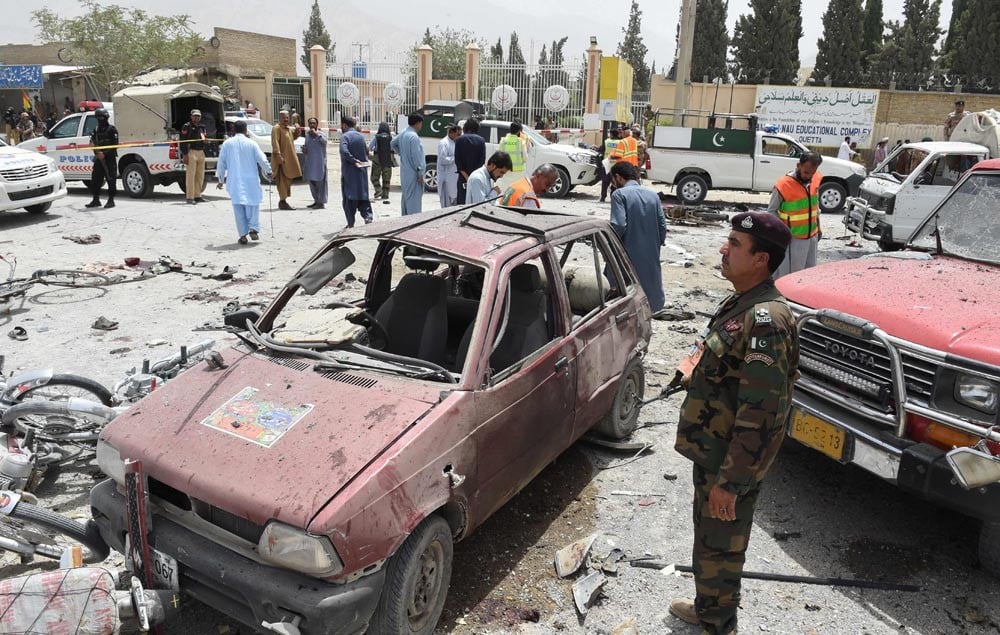
Chiefs of Intelligence agencies of China, Russia, Pakistan and Iran met in Islamabad for the first time ever to counter the creeping threat of ISIL in the region

The recent Mastung suicide attack in which 149 people were killed was claimed by the Islamic State of Iraq and Levant-Khorasan Province (ISILK), the Afghanistan section of the international terrorist organization. This attack took place two days after the unprecedented meeting of the spy chiefs of China, Russia, Pakistan and Iran who met in Islamabad for the first time ever to counter the creeping threat of ISIL in the region.
Fifty-five suicide attacks have been claimed by ISILK or ISK in Afghanistan and Pakistan since it was formally formed in 2015. The latest is the Quetta blast that killed 31 people outside a polling station on election day.
Russian News Agency TASS quoted Sergei Ivanov, spokesperson of the Russian Foreign Intelligence Service saying, "The conference held in Islamabad focused on the danger arising from ISIL on Afghan territory, and developed an understanding of the importance of coordinated effort to prevent the trickling of these terrorists from Syria and Iraq to Afghanistan, from where they would pose risks for neighbouring countries".
Nine of the 34 provinces of Afghanistan including some important ones like Khorasan, Nangarhar, Kunar and Helmand have become throttleholds of ISILK.
Moreover, Afghanistan-based militant group the Islamic Movement of Uzbekistan and commanders of the Tehreek-e-Taliban Pakistan from Peshawar, Hangu, Kurram, Khyber, Orakzai and Lakimarwat have pledged allegiance to Abu Bakar Al-Baghdadi, the self-proclaimed Caliph and leader of ISILK. These TTP commanders include Hafiz Saeed Khan, Shahidullah Shahid, Hafiz Daulat Khan and Khalid Mansoor. Hafiz Khan Saeed was appointed the first head of ISILK by Al-Baghdadi.
"The head of Lashkar-e-Islam, Mangel Bagh Afridi, and Lashkaer-e-Jhangvi formed an alliance with ISIL in Pakistan", former head of Military Intelligence Brig (R) Ghazanfar Ali tells TNS, "LeJ and some other sympathizers of ISIL have a stronghold in Mastung, Balochistan which will ultimately become a threat to Iran and Russia".
Russia and Iran are also in alliance with Syria and Iraq to counter ISIL. This Russia -Syria--Iran - Iraq (RSII) coalition is also referred to as 4+1 in which ‘plus one’ refers to Hezbollah of Lebanon.
Though the principal concern of the meeting of the spy heads was to counter ISIL getting lethal in Afghanistan, but the vanguard of this war, Afghanistan itself didn’t partake in this unprecedented consultation.
"This quadruple alliance is ensured by ongoing negotiations among these four states", Major General (R) Rahat Latif said while talking to TNS, "Turkey is also expected to join this coalition in the future but I don’t see Afghanistan in the picture, as its government is profoundly influenced by the US, which is not interested in the removal of ISIL".
Senior analyst Rahimullah Yusufzai expresses disagreement with General (R) Rahat’s views, saying that without taking Afghanistan on board such an exercise cannot bring a long-lasting outcome.
"ISIL might be a grave threat for Pakistan and Iran, but it is operating freely in Afghanistan. Russia and China won’t be an easy target for ISIL in the near future, but they might get affected if ISILK stretches itself without restrictions", Yusufzai told TNS, "Therefore, Afghanistan must be in the united front if this coalition is to achieve targets against this lethal organization".
The war in Afghanistan has been the second-largest US combat force participation after Vietnam. 17 years of American-led efforts to stabilize Afghanistan have not born much fruit. Russia has levelled allegations that the United States is behind the growing influence of ISIL, particularly in northern Afghan provinces bordering Central Asian countries. Washington dismissed the charges as rumors and an attempt to justify Moscow’s links to the Taliban insurgency.
"Amid regional forces mistrust of US forces is at its peak. Therefore, keeping USA out is the best way till this newly formed coalition comes up with a common agenda for this region. The important matter is that regional forces have accepted ISIL as a serious threat and are willing to act accordingly", Yusufzai says.
The chief difference between Taliban and ISIL which has, perhaps, helped establish such a regional alliance for the first time is that Taliban are considered nationalists; their chief purpose is to operate within the established boundaries of Afghanistan and they have never openly pledged allegiance towards any foreign organization or group. However, ISIL is globalist and doesn’t recognize borders; it declared a cross-border Islamic state in 2013 and announced a global Caliphate in mid-2014, and has claimed attacks in more than 50 countries since then.
Although both the Taliban and ISIL practice extremist variations of Sunni Islam, Taliban believe in a form of the Deobandi branch which is essentially less extreme than the version of the Wahhabi-Salafist tradition practiced by ISIL.
It’s reported that Islamabad, Moscow, Beijing and Tehran have all maintained contacts with the Taliban.
These countries are also part of the Shanghai Cooperation Organization (SCO). Russia has 156 trade agreements with Afghanistan, and China has been the biggest investor there, especially in copper and other minerals.
"The role of Iran and Pakistan in this alliance seems more sectarian based, rather than having the purpose of establishing permanent peace and economic prosperity. Both are seeking a role on religious grounds, whereas Russia and China are aspiring for economic and scientific progression through an establishment of regional hegemony", author and analyst Professor Mobarak Haider states.
He adds, "Pakistan and Iran are not fighting to establish peace but to impose their own religious mindsets, as both fought the Taliban in the past by saying that they were religiously misguided, and the same tool is being applied against ISIL while taking Taliban onboard.".
"Permanent peace and economic prosperity of this region must be the common agenda of this four-way united front, otherwise there will be skepticism over the seriousness behind establishing this partnership", says Haider.